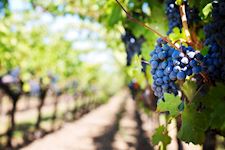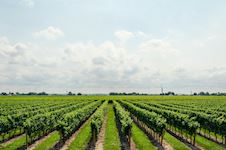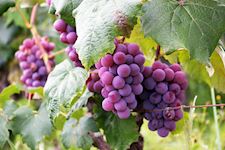Viticulture - Endorsed Certificate Course (TQUK - Training Qualifications UK)
Distance learning course with study materials, tutor support and final exam included
Academy For Distance Learning
Summary
- Exam(s) / assessment(s) is included in price
- Tutor is available to students
Add to basket or enquire
Overview
Viticulture Online Course.100 Hours Endorsed Certificate Course (TQUK - Training Qualifications UK).
Learn the techniques and become a successful Viticulturalist. This course will help you develop an ability to select and cultivate appropriate varieties of grapes in different situations, and provide the knowledge to make informed decisions about the management of a vineyard.
There are ten lessons covering the history of viticulture, the current state of the industry, wine and table grapes, dried grapes, cultural practices (trellising, soils, planting, pruning, irrigation, pests & diseases); vineyard design, improving quality, harvest & post harvest procedures, wine-making, marketing and more.
Learn to grow Grapes
A serious course for vineyard workers, hobby farmers, farm managers, amateur enthusiasts, or anyone working or aspiring to work in this industry.
Benefits of an ADL Endorsed Course?
Endorsed courses are skills based. They have been evaluated and approved by an independent awarding body such as Training Qualifications UK (TQUK).
What makes ADL’s Endorsed courses different?
- Flexible Self-Paced Learning– adjust your learning around your home and work commitments
- Start and Finish at any time
- Courses globally and industry relevant
- Practical Component at the end of most lessons.
Allocated your own tutor relevant to your subject. You can have as little or as much contact as you like with your tutor. They are there to support you all the way through.
This course is endorsed by TQUK -Training Qualifications UK, an OFQUAL awarding body.
Achievement
Course media
Description
Lesson Structure:
1 Introduction
- Nature and scope of the viticulture industry both locally and world wide
- Global viticulture
- Major winegrowing areas around the world
- The grape; genera and species
- Rootstocks
- Classification of grape varieties
- Table grapes
- Wine grapes
- Dried fruit
- Juice grapes
- Canned grapes
2 Climate and Soils
- Suitable climate and soil conditions for vineyard site establishment
- Temperature; temperature calculations; latitude-temperature index and degree days
- Sunlight
- Rainfall
- Soil; soil types and wine regions; understanding soils; texture; characteristics; soil structure; chemical characteristics of soils including pH and nutrient levels
- Understanding plant nutrition
- Soil water content
- Simple soil tests; naming the soil
- Problems with soil; erosion; salinity; structural decline; soil acidification; chemical residues
3 Selecting Grape Varieties
- Appropriate grape varieties for different situations.
- Grape types
- Selection considerations
- Matching the variety with the site
- Varietal characteristics
- Selecting wine grapes
- Yeild
- Reviewing important varieties; chenin blanc; chardonnay; semillion; muscat ottonel; muscadelle; gewurztraminer; cabernet sauvignon; carignan
- Vitis rotundifolia
- Wine grapes; raisin grapes; juice grapes
- Importance of rootstocks
- Purchasing plants
- Phylloxera
4 Vineyard Establishment
- Procedure to establish a vineyard
- Vineyard planning
- Site planning
- Vineyard layout
- Site preparation
- Planting the vines
- Vine spacing
- Shelter belts
- Crop infrastructure
- Equipment
5 Grapevine Culture Part A (Training & Pruning)
- Techniques used in the culture of grape vines
- Pruning and training vines
- Shoot spacing
- Bud numbers
- Vine spacing
- How much to prune
- Machine pruning
- Summer pruning
- Combination pruning
- Pruning sultana vines
- Trellising
- Trellis construction
- Guyot system
- Geneva double curtain system
- Head training
- Cordoning
- Kniffen systems
- Umbrella kniffen system
- Pergola training system
6 Grapevine Culture Part B (Weeds, Pests & Diseases)
- Types of weeds
- Controlling weeds
- Safety proceedures when using agricultural chemicals
- Laws and guidelines
- Types of chemicals
- Weed management before planting
- Weed management in new vineyards
- Weed management in established vineyards
- Integrated pest management
- Pest control in vineyards
- Grape berry moth
- Grape mealy bug
- Grape leaffolder
- Grapevine rust mite
- Grape blossom midge
- Flea beetles
- Birds and arge animals
- Disease control in vineyards
- Fungal diseases; rots; mildew; eutypa dieback etc
- Bacterial diseases
- Viruses
- Organic culture of grapes; organic pest and disease control
- Companion plants
- Managing environmental problems including air, water, damage, frost, hail, wind and shade
- Water mangement; runoff; water saving
- Grape clones and varieties
7 Grapevine Culture Part C (Irrigation & Feeding)
- Irrigating and feeding grapes
- Excessive irrigation
- Seasonal effects of irrigation
- Drip irrigation
- Monitoring and timing
- Feasibility of irrigation
- Design considerations
- Soil and water
- Measuring water available to plants
- Calculating permanent wilting point
- Calculating field capacity of a vineyard
- Available moisture range
- Measuring air filled porosity
- Tensiometer
- Estimating water
- Rate of growth
- Climate
- Drainage in vineyards; improving subsoil and surface drainage; subsurface drainage
- Soil fertility; choice of fertilizer; timing of application; fertigation
8 Improving Grape Quality
- Ways to ensure or improve grape quality.
- Plant stock
- Crop management
- Post harvest impact on quality
- Improving flower and fruit set
- Second set
- Girdling
- Berry thinning
9 Harvesting & Selling
- Procedure for harvest and post-harvest treatment
- Harvesting
- Testing for ripeness
- Influence of weather
- Harvesting techniques
- Selling grapes
- Vineyard resume
- Selling grapes
- Marketing contracts
- Selling online
- Developing a marketing plan
- Advertising
- Market research
- Legal considerations with marketing
10 Wine
- Basic principles of wine making
- Overview of winemaking process
- Production principles
- Fermentation
- Making white wine
- Making red wine
- Methods
Each lesson culminates in an assignment which is submitted to the Academy, marked by the Academy’s tutors and returned to you with any relevant suggestions, comments, and if necessary, extra reading.
Who is this course for?
Wine Enthusiasts
Requirements
A pc or laptop with internet connection
Career path
The UK viticulture industry is expanding with over 2,000 hectares now under production, mainly, but not entirely, on the south coast of England. The UK is a nation of wine lovers and this sector requires growers, entrepreneurs and marketers, with career opportunities both in the UK and overseas.
Questions and answers
Currently there are no Q&As for this course. Be the first to ask a question.
Reviews
Currently there are no reviews for this course. Be the first to leave a review.
Legal information
This course is advertised on reed.co.uk by the Course Provider, whose terms and conditions apply. Purchases are made directly from the Course Provider, and as such, content and materials are supplied by the Course Provider directly. Reed is acting as agent and not reseller in relation to this course. Reed's only responsibility is to facilitate your payment for the course. It is your responsibility to review and agree to the Course Provider's terms and conditions and satisfy yourself as to the suitability of the course you intend to purchase. Reed will not have any responsibility for the content of the course and/or associated materials.





